#Oedipus the King
Text
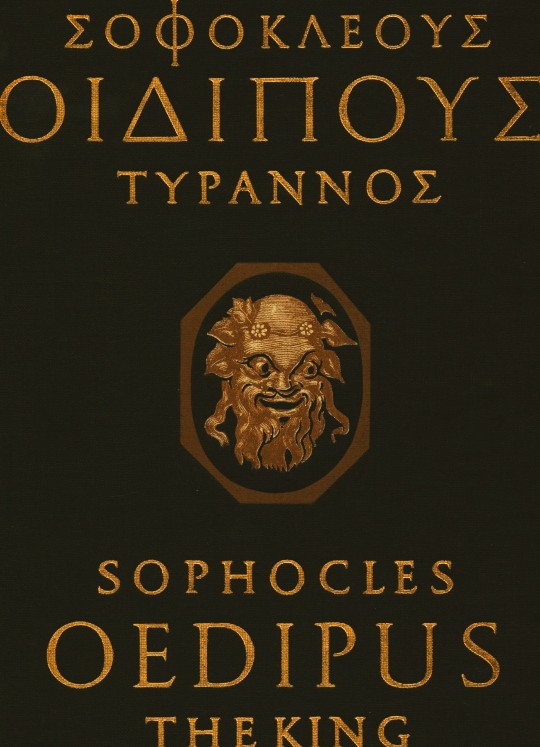
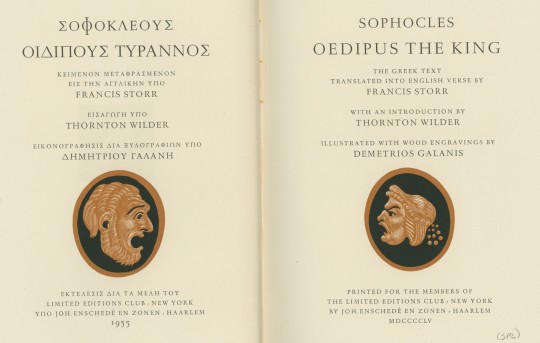
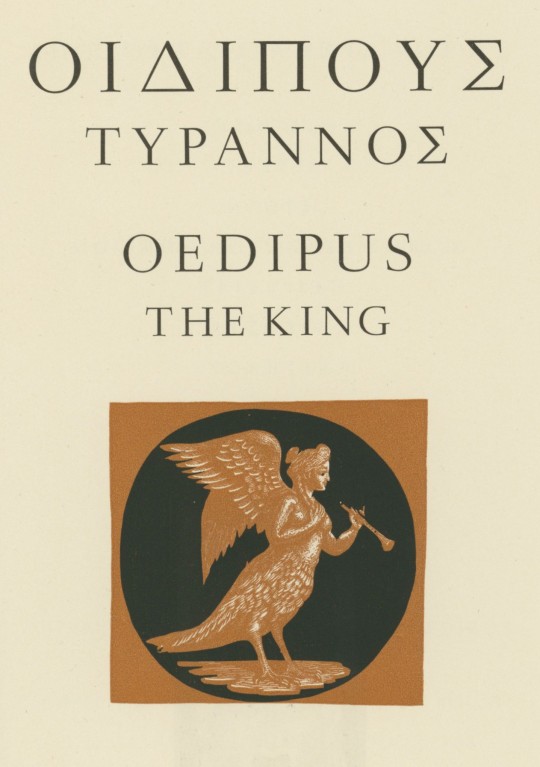


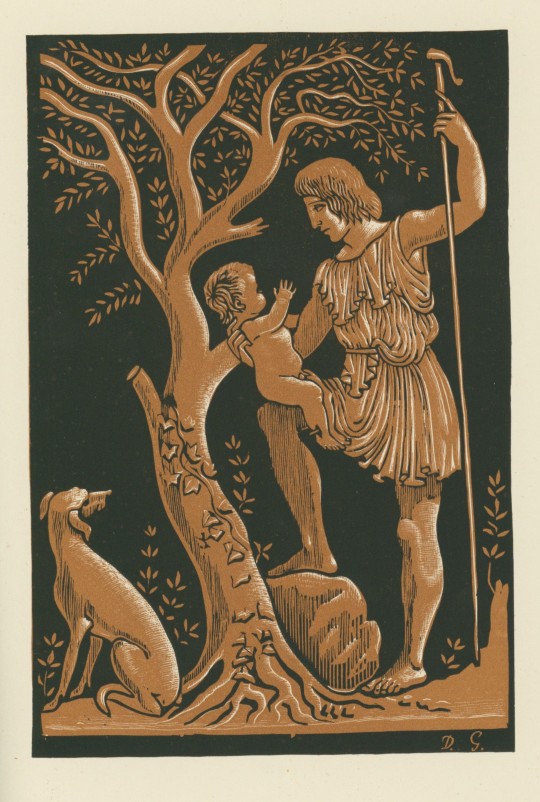
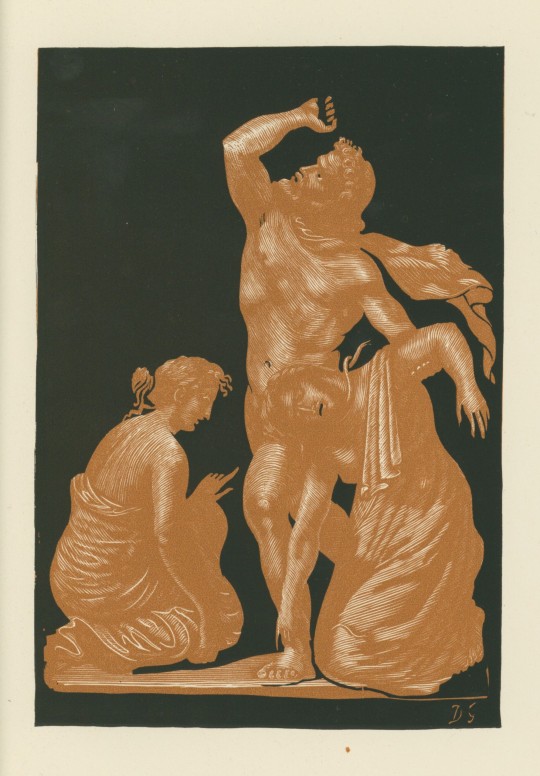

Tragically Greek
This 1955 edition of Oedipus the King, written by Sophocles, features the original Greek text alongside the English verse translation. Offering a rich, immersive reading experience results from hard work, dedication, and creative minds coming together to create this masterpiece.
Jan van Krimpen (1892-1958), Dutch typographer, book designer, and type designer, designed the two typefaces. The Greek type is named “Antigone,” and the English type is called “Romulus.” The translator for this work was Francis Storr (1839-1919), a British classicist, translator, and teacher.
The paper was specially manufactured at the historic Dutch Pannekoek Papermill, a mill with a rich history that unfortunately met its end in a fire in 1944. This exclusive feature adds a touch of rarity to your reading experience. Printed in the offices of Johannes Enschedé, under the supervision of Mijnheer van Krimpen, it was for the members of the Limited Editions Club.
Adding to the richness of this edition is the detailed and insightful introduction provided by Pulitzer Prize winner Thornton Wilder (1897-1975), American playwright, novelist, and native of Madison, WI. His esteemed perspective offers an enlightening preface to the classic tale.
The illustrations are black and terra-cotta wood engravings designed by Greek artist Demetrios Galanis (1879-1966). He was the trailblazer of modern Greek engraving and was once touted as one of the greatest living Greek artists at the time of the book’s release.
Sophocles (c. 497/496 – winter 406/405 BC) was an ancient Greek playwright born in Colonus near Athens. He is one of the three great tragedians of classical Athens, along with Aeschylus and Euripides. Sophocles wrote over 120 plays during his lifetime, although only seven have survived in their entirety. His works are characterized by their complex characters, well-crafted plots, and profound exploration of moral and philosophical themes.
Among his most famous plays is the tragedy Oedipus the King. The story is about Oedipus, the king of Thebes, who tries to uncover the truth behind a plague that has struck his city. In doing so, he discovers that he himself is responsible for the plague, having unknowingly killed his father and married his mother. The play delves into themes of fate, free will, and the consequences of one's actions.
-Melissa, Special Collections Classics Intern
View other Classics posts
#classics#sophocles#oedipus#oedipus rex#oedipus the king#greek mythology#greek#wood engraving#athens#tragedy#greek tragedy#ancient greece#oedipus complex#Limited Editions Club#Johannes Enschedé#Enschedé#Jan van Krimpen#Antigone type#Romulus type#Francis Storr#Demetrios Galanis#Pannekoek paper#LEC#Thornton Wilder#Melissa
57 notes
·
View notes
Text
Unknown bookshop clerk who put Oedipus the King in the whodunnit section I love you
680 notes
·
View notes
Text


Propaganda:
Oedipus: it's like... the first detective story. and the answer is that he fucked his mum and killed his dad. i love him
Lauren Sinclair: She can tell when others are lying, and is so determined to get justice against the Phantom Scythe that she willingly teams up with an assassin and becomes part of a vigilante duo.
#polls#horror#best detective character tournament#best detective character#oedipus the king#lauren sinclair#webtoon#purple hyacinth
14 notes
·
View notes
Text

Essays for class have been solved by treating them like fanfic character studies instead
#this class is KILLING ME. but it will be over this week#then i get 2 weeks off yippee yahoo!!#type: other#fandom: none#oedipus#oedipus the king#greek mythology#ancient greece#greek history
8 notes
·
View notes
Text
Scholars on Greek mythology and drama seem locked in an endless debate of what Oedipus's hamartia is in Sophocles' play, or even if he has one at all. And if he does have a hamartia, whether it's a "tragic flaw" in the moral sense, or just an error or lack of information. A search through different analyses of the play online will reveal widely different interpretations.
So I thought I would find out what my Tumblr community thinks.
#greek mythology#oedipus#oedipus rex#oedipus tyrannus#oedipus the king#sophocles#hamartia#tragic flaw#tragedy#analysis#aristotle#poetics
18 notes
·
View notes
Text
I think it's interesting that ppl want Oedipus to have some sort of hamartia or fatal flaw, that need for the horrible things he endured to be Justified somehow must be comforting in a way.... the alternative being that the Gods are cruel and distant and harsh. hm.
#tragedy! when the feeling's gone and you can't go on it's!#oedipus the king#i wish i could articulate this better. hnmg#oedipus made me cry just a littol im ngl
2 notes
·
View notes
Text
reading Oedipus it's so funny how Jocasta's like "when our son was born we received a prophecy that he would kill his father and marry me, his mother"" and Oedipus is like "huh that's funny, when I was born there was a prophecy that I would kill my father and marry my mother...." and Jocasta is like "well the prophecies must not be true because my son didn't kill my husband, you did :) nothing to worry about"
9 notes
·
View notes
Text
"As classical tragedy developed, however, the hero's reversal of fortune was increasingly portrayed as a result of a frailty or fault in the character of the protagonist --- the 'fatal flaw'."
on Oedipus the King (focus on Classical Greek Drama)
from The Literature Book: Big Ideas Simply Explained, James Canton
leave a little kindness
#juli-quotes#james canton#the literature book#big ideas simply explained#oedipus#oedipus the king#classic#classics#classical#classical tragedy#classical greek drama#greek#greek drama#greek mythology#greece#academia#dark academia#light academia#fatal flaw#character#literature#juli-the-literature-book#hero#classical hero
17 notes
·
View notes
Text
West Country Oedipus AU in which, instead of talking constantly about how he 'sees' the situation, making eye puns every fuckin' page, he just says 'Gor Blimey' every ten seconds.
#greek mythology#oedipus#oedipus rex#oedipus the king#oedipus tyrannus#apologies to anyone who doesn't get british slang#but just know#this is actually the best joke i've ever made
3 notes
·
View notes
Text
Speculation on Y. Pestis Bronze Age European plague, and the plague depicted in Sophocles rendition of Oedipus legend - which has gone on to inspire reworkings of the tale down to the present day (including Freud)
The following is PURE SPECULATION. 3 things conjoined -a while ago I greatly enjoyed Mark-Anthony Turnage's "Greek" https://youtu.be/8Tgp3K6TU2Y , an opera based on Stephen Berkhoff's East End updating of Sophocles "Oedipus Rex". This "In Our Time" on it reminded me that the story was (1) set in the Bronze Age , and (2) Thebes was suffering with a "plague" that Oedipus's Answer to the riddle of the sphinx cures https://www.bbc.co.uk/programmes/m001mlm4 . The thing is - there was indeed a real-life plague in the Bronze Age, which we now know infected people in Britain also, https://www.nature.com/articles/s41467-023-38393-w and caused by the familiar Yersinnia Pestis bacterium that also caused the Black Death ..... Could this be the "smoking gun" that traumatised a population who, uncomprehending the scale of the tragedy wove it into a myth that influenced people over centuries (including Freud) down to the present day????? We probably will never know, but it is worth considering
youtube

Phylogeny, Cladogram and distribution map from https://www.nature.com/articles/s41467-023-38393-w/figures/1
#Berkhoff#Stephen Berkhoff#Greek#Mark-Anthony Turnage#Turnage#Oedipus#Oedipus the King#Oedipus Rex#Sophocles#Bronze Age#Bronze Age Plague#Sphinx#Trauma#Black Death#Y. Pestis#Yersinnia Pestis
4 notes
·
View notes
Text
I'm currently reading/watching Oedipus the King in my Theatre Appreciation class and now I'm imagining a scenario where Bruno has a vision so horrible that he rips his eyes out.
#can you tell i need help#bruno madrigal angst#bruno madrigal whump#encanto#bruno madrigal#disney encanto#an idea for fanart or one shot i guess#oedipus the king#bruno oedipus au#minus ancient Greece and incest/killer curse thing#encanto fanart#encanto fanfic#someone take my writing rights away lol
11 notes
·
View notes
Text
Today, my semester final classes has officially began and I don't like it. The best and the worst part of time is that it flows away. There are soo many things needed to be done, so many things to learn, to mold my psyche into gained experience. Not to mention the future,

4 notes
·
View notes
Text


Propaganda:
Oedipus: Oedipus: it's like... the first detective story. and the answer is that he fucked his mum and killed his dad. i love him
#polls#horror#best detective character#best detective character tournament#ryu su yeol#bad and crazy#Oedipus the king#Oedipus
5 notes
·
View notes
Note
why are you gay
I've met your mother.
2 notes
·
View notes
Text
Living Within Time
My professor said something very insightful yesterday about living within time. We as human beings are not able to know what the future is, but we make choices within the present that will effect this future in an unknown way. So how does a human being find the courage to effect their own future? It is bizarre and fascinating how we have come to normalize this idea within society to be living within the present, but always turning the focus to the future. The ancient peoples of Greece and Egypt turned their focus to the afterlife by forming physical architecture to represent their dedication to this unknown future beyond the great barrier of death. As Americans, there is always talk of the future generations and how they will look upon us or be affected by the decisions that are made in the present. Even on a personal level, teenagers are meant to make life altering decisions at the age of 17-18 years old with having no previous decision-making experience. And here we sit locked inside the confines of time, yet peering into the future. Something to always come before (informing the decision), something always to come during (the decision itself), and then something to follow (the consequence).
There is an opinion that people are so obsessed with the idea of the future because it is unknown. There are ways to effect the future through choices made in the present, but in reality, we will never know how things will turn out (There is a book called “The Midnight Library” by Matt Haig that I recommend to those who are interested in this idea). However, I call upon Oedipus the King when I discuss this next point. There is also the idea that human beings actually have no free will at all, and all choices are merely illusions orchestrated by some higher power.
If you are not familiar with Oedipus, I will summarize briefly the important bits you need to know in order to grasp the next point. Oedipus was known as being a very wise man who solved the Riddle of the Sphynx making him a hero to the kingdom. He was only in the kingdom because a prophecy told him that he would grow up to murder his father and sleep with his mother, so he left his family behind and found great fortune in Thebes, becoming King after his heroism. He married the Queen and fathered four children during the 20 years he was King, but there was a great plague over the kingdom which he was determined to remedy. Many soothsayers and prophecies later he found himself upon a great and horrible revelation. In a great twist of fates, it turns out that who he thought were his real parents were actually his adopted parents, and his biological parents were actually the King and Queen of Thebes. He had murdered the King on his way to Thebes all those years ago, and had since been sleeping with the Queen, his own mother. Theres more to it, but these are the important bits for my purposes.
Once a great King, he is now known as the man who could not escape his fate and is synonymous with Sigmund Freud’s theory about all men wanting to have sex with their mothers (disgusting really). Obviously Oedipus is a fictional character, but my point is this: We are not obsessed with the future because it is unknown, we are obsessed with the future because we want to impact it. What if we made all these decisions and went through all this stress of life only to find out that everything was actually planned for us already? This is the tragedy of Oedipus in my mind. The idea that within the confines of time we truly have no say in our fate, since no matter what choice is made the outcome will remain the same. And we would know no differently. Yes, the future might be unknown, but what if it also has been decided for us by some higher power, and the experience of being human, and making choices, and creating a meaningful life is undermined by a lack of free will. This is why the future is scary in my mind, because hypothetically no matter what I do or how much I learn things have already been decided by someone who is not me.
To clarify, I prefer not to think this way because my life has had its own tragedies that I don’t want to think were planned by the universe, but it’s an interesting concept. Im also not sure if I am making much sense today, but I am going to make the choice to stop writing here and pick up another thought bubble another day. My advice: go out and make a choice.
4 notes
·
View notes
Text
“may the god watch over you and treat you better than he treated me.”
0 notes